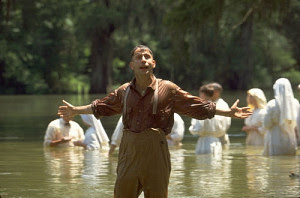In the year 2000
the film O Brother, Where Art Thou?
by directors Joel and Ethan Coen was released. It is true that three prisoners
escape from their imprisonment on the railroad and plenty of their actions
could paint them as con artists and liars. However, there are significant depictions
of religion morality that can be lifted from key scenes in this film.
Near
the beginning of their journey, the main characters Everett, Delmar and Pete
are in the forest when a congregation of church people comes through singing
“Down to the River to Pray” (Lyrics) . Mystified by
the mob and music, the main characters follow the congregation to the nearby
river where they are lining up to be baptized. Soon Delmar rushes to the
pastor, to Everett and Pete’s surprise, and has himself baptized. Then Delmar
calls to his companions saying, “Well that's it, boys. I've been redeemed.
The preacher's done warshed away all my sins and transmissions. It's the
straight and narrow from here on out, and heaven everlasting's my reward”;
Delmar beckons them and says, “C’mon in boys, the water is fine” (Clooney, Turturro and Nelson) . Immediately
Pete rushes into the river and receives baptism as well.
In
another scene, the three main characters stumble upon a ritual gathering of the
cult known as the Ku Klux Klan, or the KKK. They spot Tommy Johnson, their
musical friend, who also unfortunately happens to be black and, as Tommy had
stated in their first meeting, that he sold his soul to the devil in order to
gain his guitar skills. As Tommy is being dragged to death of hanging, Everett,
Delmar and Pete knock out a few KKK members, put on their disguises and rescue
Tommy from the ritual hanging. Before they run off, Everett cuts a wire so that
the colossal fiery cross falls upon the KKK member and con artist bible seller Big
Dan Teague. In addition, the campaigning governor Homer Stokes who is revealed
to be the leader of the KKK tries to stop and incriminate the protagonists from
their musical stage performance but then gets booed and the people throw food
at him. The sitting governor Pappy O’Daniel pardons the crimes of Everett,
Delmar and Pete.
Finally, towards the end of the film, there is the scene where Everett, Delmar, Pete and Tommy are walking when suddenly abducted by Sheriff Cooley and his associates. Three graves have been dug, and Everett, Delmar and Pete are about to be hung by the lawless sheriff when Cooley tells them, “Perhaps you should start making your prayers” (Clooney, Turturro and Nelson) . Pete is in tears, Tommy is terrified, Delmar bows his head in silent prayer, and Everett also bows his head and prays aloud, “Oh Lord, please look down and recognize us poor sinners... please Lord...The...I just want to see my daughters again. Oh Lord, I've been separated from my family for so long...I know I've been guilty of pride and sharp dealing. I'm sorry that I turned my back on you, Lord. Please forgive me, and help us, Lord, and I swear I'll mend my ways... For the sake of my family... For Tommy's sake, and Delmar's, and Pete's...Let me see my daughters again. Please, Lord, help us... Please help us...” (Clooney, Turturro and Nelson) And then all of a sudden, a huge rush of water sweeps them up, saving the protagonists and implying the death of Sheriff Cooley and his company.
From all of these scenes, it is apparent to say that religion plays a key role in the plot of this film. From the baptisms to Everett’s prayers, it is clear that the protagonists are good people and seek morality, goodness and love, even though they had escaped from imprisonment. Because of this, God saved them with the flood, which implies an allegorical reference to the biblical story of Noah. As in the story in the Bible, it seems the flood washed away Everett, Delmar, Pete and Tommy’s sins. Furthermore, the true evildoers that are Big Dan Teague, Homer Stokes and Sheriff Cooley, including George “Babyface” Nelson who was finally caught and electrocuted, were defeated. It is also noteworthy to see that the fiery cross, which symbolizes God and striking down on evil, brought down Big Dan Teague. In all, the film O Brother, Where Art Thou? puts a great deal of focus on the belief of God, and the idea of morality is supported by the pardon and triumph of the protagonists and the defeat of the immoral antagonists.
Works
Cited
Lyrics,
Soundtrack. O Brother, Where Art Thou? Soundtrack Lyrics - Movie.
2014. 13 April 2014
<http://www.stlyrics/com/o/obrotherwhereartthou.htm>.
O Brother, Where Art Thou? Dirs. Joel Coen and Ethan Coen. Perf.
George Clooney, John Turturro and Tim Blake Nelson. 2000.
